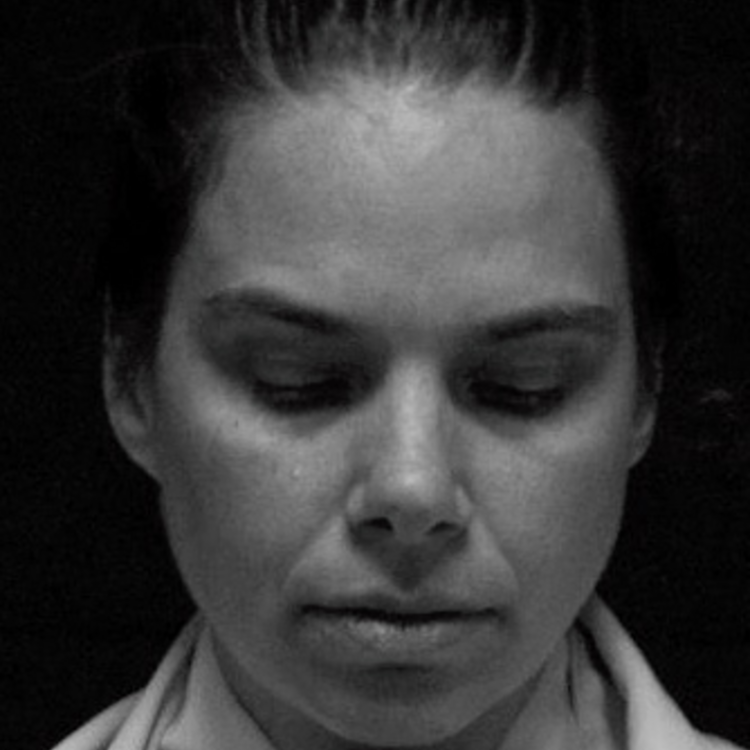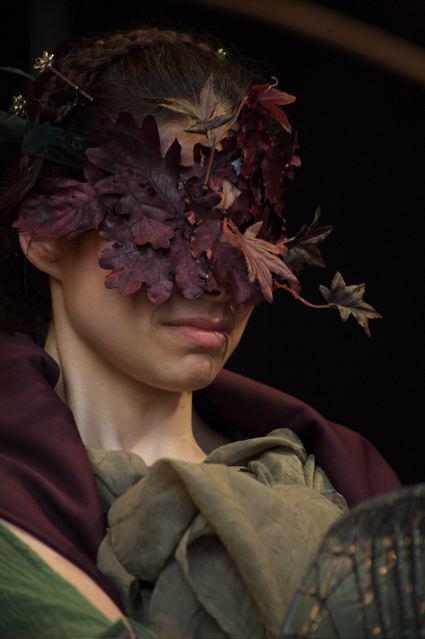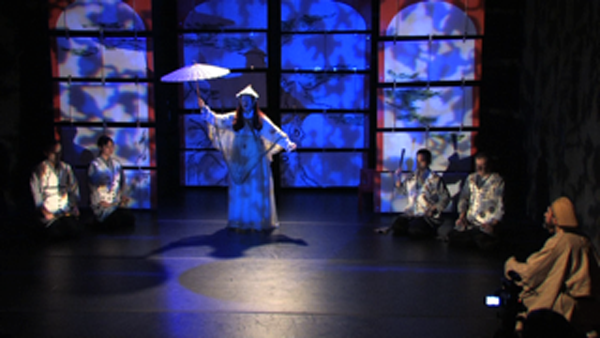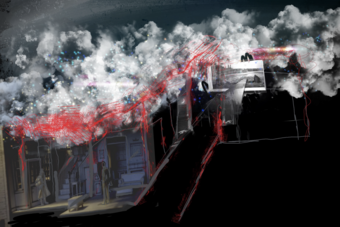Baby Stepping My Way to Yugen
This four-part series explores the pursuit of yugen in theater.
Yugen, from which our theater takes its name and aesthetic principles, is notoriously difficult to translate/define; yet I’ve always felt like I know what it means. The Japanese word yugen, a philosophical and aesthetic term first associated with poetry, is composed of the two Chinese Kanji characters—“yu” and “gen.” “Yu” means deep, quiet, otherworldly; “Gen” means subtle, profound and dark. While no succinct definition exists, it has been described as "gentle gracefulness," “mysterious charm,” "snow in a silver bowl," or "refined beauty, which can only be appreciated with the heart."
For the last two decades I have engaged in a personal pursuit and proliferation of the intangible essence of yugen. The process of directing the world premiere of Chiori Miyagawa's This Lingering Life is currently forcing my pursuit down unfamiliar pathways, though the territory is familiar. As I follow these pathways, I wish to engage in an open reflection with some key collaborators—Erik Ehn, Greg Giovanni, and Chiori Miyagawa—on the playwright/director process. I’ve asked them to join this meditation on how yugen has affected our work and our lives.
Half-Hidden Beauty
In early Japanese poetic aesthetics, yugen meant the deep and unknowable, its expression characterized by elegance and sensitivity to the pathos of things. Twelfth century poet and essayist Kamo no Chomei explains:
It is only when many meanings are compressed into a single word, … a poetic conception of rare beauty is developed to the fullest extent in a style of surface simplicity—only then, when the conception is exalted to the highest degree and “the words are too few,” will the poem, by expressing one’s feelings in this way, have the power of moving Heaven and Earth within the brief confines of a mere thirty-one syllables, and be capable of softening the hearts of gods and demons.
Finding a Path, or Forget the Theatre and Look at Noh
In 1993 I was preparing for my first production under the direction of Theatre of Yugen founder and then artistic director Yuriko Doi. She recommended I read “Fūshi kaden” or “The Transmission of the Flower of Acting Style” by Zeami (considered the ‘Father of Noh,’ a brilliant theatre practitioner and writer of theatrical masterpieces). An inspirational book of instruction for Noh actors it is a seamless synthesis of a poetic aesthetic treatise and a manual for life as well as acting. One read and I was hooked. Zeami’s artistic goal was to create a highly poetic, multisensory stage event; while alluding to an already familiar story and by means of poetry, music, and dance he strove to create a cohesive space wherein the audience could feel the subtle, echoing feeling of yugen.
I was young, knew nothing, and was impressionable. I remember being fond of Yuriko’s direction. She would say things like, “go forward from here” while pointing to her heart. No one had ever given me direction like that before. That first play was the beginning of my romance with Noh (performed in Japan since the thirteenth-century, it’s the world’s oldest, continually performed, masked lyric drama) and I fell hard. My learning to “dance a part,” the awakening of my desire for yugen—which I thought I could acquire simply through the acquisition of technique— and the placing of myself on a path, with teachers way out in front and students close behind, became my way.
Step One, or Forget Noh and Look at the Actor
Erik Ehn, artistic associate of Theatre of Yugen, is a humanitarian and a poet drawn to weighty topics that prove to be aesthetically challenging. He and I came to Noh separately. We were actively unearthing Noh —he through words (scripts, text, translations), me through my body (singing and dancing)—at the same time.
In 2009, following a shared journey to genocide memorials and cemeteries in Bosnia and Rwanda, Erik wrote Cordelia (2011) for long-time stage partner Lluis Valls and me. Basically a two-hander wherein we envisioned King Lear as a genocidaire attempting to erase a daughter whose love and loyalty won’t permit it. It doesn’t end well. It could have been worse. This was the first time I was to direct and perform in one of Erik’s plays. I found myself inching Cordelia toward the structure of a Noh play. Erik was fine with that—until he wasn’t. The first ‘no’ from Erik came on my last request and was like pulling a lynchpin. By challenging my interpretation of the chorus’ role, he was bidding me forget Noh; embrace its fixed yet unresolved nature; look at the actor and search for yugen in duality, in opposition, and most meaningfully in the breaking of form.
Step Two, or Forget the Actor and Look at the Idea
In 2012 Theatre of Yugen mounted Greg Giovanni’s A Minor Cycle: Five Little Plays in One Starry Night—five small works for the stage based on children’s literature. A sound mathematician, Greg’s world building is loose, remarkably idiosyncratic, and prone to gaps, sentimentality and irrepressible childlike joy, while Erik’s is fast, lean, and tight. I needed to adjust.
My work with Greg was an extensive exploration of the marriage of form and content. We looked at the traditional Japanese theater forms as containers and worked to figure out what each could hold. For the first time I began shifting my inquiry away from form and toward content and the dynamic relationship between the two. Our collaboration was also an exercise in nurturing the spiritual sticky stuff that binds us and keeps us on the path.
Step Three, or A Move from the Heart or Forget the Idea and You Will Understand Noh
Reflecting on these collaborations brings me to the project at hand: I will direct and perform in Chiori Miyagawa’s This Lingering Life to premiere at Z Space in San Francisco from June 5 – 14, 2014. Chiori describes her play as “Nine Noh plays in One (or Two) American Act(s).” In fact Chiori disregards the form of Noh, creating her own, and focuses solely on its content. It is an ingenious new play wherein Chiori and I somehow meet on the far side. I, a farm girl from the northeastern US, will bring traditional Japanese theater techniques to the Western style, text rooted, story-based play written by a girl from Japan’s countryside.
I’ve not known Chiori for long but have already determined that like Erik and Greg, the distance between her and her work is non-existent. Through her play, she is bidding me to be reverently irreverent, non-poetical, funny, steadfast and a woman who embraces the American spirit and the twenty-first century. Her invigorating reworking of these ancient plays, and their even older stories has disrupted my vision. Long seduced by the tragic, slow-moving, melancholic haze of yugen, I am allowing This Lingering Life to entirely reframe my view. The fragmented, quick-fire coexistence of the heartrending content of nine Noh plays begets the question of what is the appropriate container for this play. Our current world making is the first step towards an answer.
I could not have attempted This Lingering Life before now. Radically different than anything I’ve ever done, it is absolutely the right next step. The play is funny, and to my great surprise, the play’s theatrical charm and humor actually augment the yugen. Humor—that serious distortion of our world—opens the door to the deeper, more ineffable emotions and to that most human thing of all—our mortality.
Erik says, “plays are good to think with.” The process of making them is rich in its demands and rewards. I’m incredibly grateful for the guiding, warm fellowship I’ve had on the long slow path.
Zeami wrote:
Forget the theatre and look at Noh
Forget Noh and look at the actor
Forget the actor and look at the idea
Forget the idea and you will understand Noh
***
Images:
Jubilith Moore as Helen Keller in Erik Ehn's Dark / Silent. Photo credit: David Page.
Jubilith Moore as Cordelia in Erik Ehn's Cordelia. Photo credit: Risa Lenore Dye.
Sheila Berotti in St. Matthew's Fair by Greg Giovanni. Photo credit: Charlene Formenty.
Hannah Lennett, Alexander Lydon and Lluis Valls in Chiori Miyagawa's This Lingering Life. Photo credit: Paulo Presotto.













Comments
The article is just the start of the conversation—we want to know what you think about this subject, too! HowlRound is a space for knowledge-sharing, and we welcome spirited, thoughtful, and on-topic dialogue. Find our full comments policy here
Thanks to Laurie and Nick for your steadfast fellowship. Lucky me!
Shining. Gorgeous. Truth.
What a beautiful reflection. I have always been impressed with your steadfast, entirely poetic nature. Thanks for sharing your thoughts and dreams with us. This set my day on a lovely course.